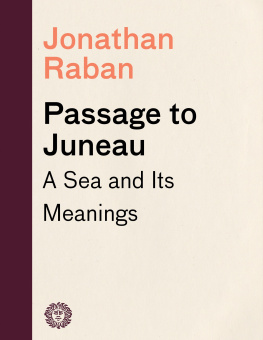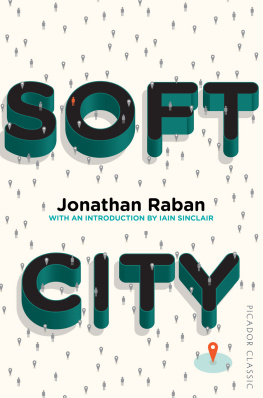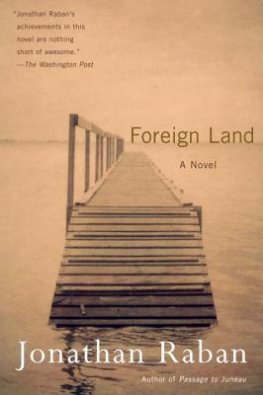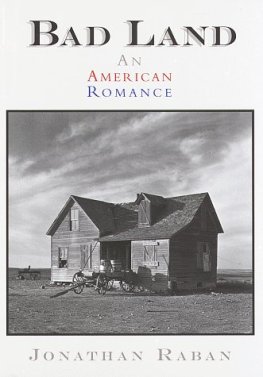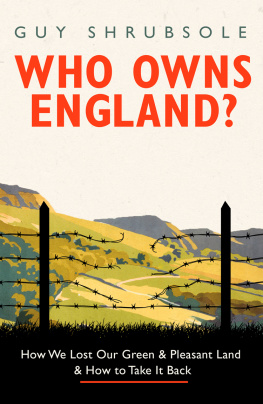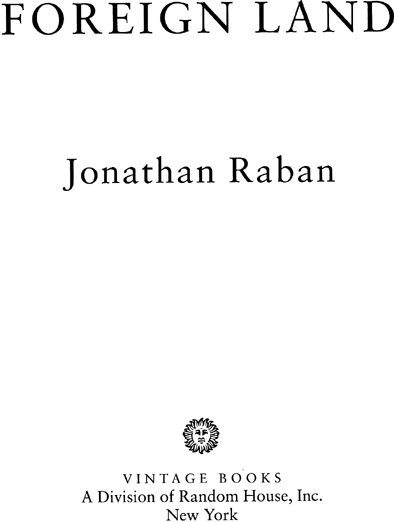Acclaim for Jonathan Rabans
FOREIGN LAND
His sheer skill is enlightening: throughout this splendid novel he maintains an extraordinary vision.
Newsweek
The Guardian
This is a rich, inventive narrative, held together by a net of resonant, yet discreet symbols, brilliantly comic at times, and so full of good stuff as to make most other novels look undernourished and etiolated.
The Times Literary Supplement
A superbly written book few contemporary writers can have evoked so powerfully the temper and texture of the ocean.
The Sunday Telegraph
Raban invests his characters with such freshness and warmth, writes prose of such Wordsworth-like beauty, and does it all with such effortless mastery that he takes the readers breath away.
The Washington Post
Engaging, eventful, often very funny and quite beautifully written.
The Times
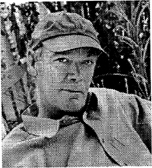
Jonathan Raban
FOREIGN LAND
Jonathan Raban is the author of Soft City, Arabia, Old Glory, Coasting, For Love and Money, Hunting Mister Heartbreak, Bad Land, and Passage to Juneau; he has also edited The Oxford Book of the Sea, Raban has received the National Book Critics Circle Award (for Bad Land), the Heinemann Award for Literature, the Thomas Cook Award, the Pacific Northwest Booksellers Award, the Governors Award of the State of Washington, and the PEN West Creative Nonfiction Award, among others. In 1990 Raban moved from London to Seattle, where he now lives with his daughter.
ALSO BY Jonathan Raban
Soft City
Arabia
Old Glory
Coasting
For Love and Money
God, Man, and Mrs. Thatcher
Hunting Mister Heartbreak
The Oxford Book of the Sea (editor)
Bad Land
Passage to Juneau
CHAPTER ONE

I t was a shadowless London morning; a grudged measure of twilight between darknesses. They breakfasted under a bare 150-watt bulb. Sheila worked her passage through a plate of All Bran, Tom drank coffee from a mug with a thick and warty glaze. The window of the tall room at the back of the house showed a lawn of fallen plane leaves, a clogged birdbath, a torn fence, and then the city, lying far below them like a lake. It was thunderously still and black.
Sheila held her fathers letter, a single sheet of onionskin.
Hes coming back. For good, he says.
Tom was staring at the stamp on the envelope. There was a flag, with some gaudy Third World heraldry on it, a sword, a fishing boat, a torch, some sort of tree.
Great, Tom said, losing the word in his beard. He went on looking at the stamp. Then, Why?
What do you mean, why? Hes sixty.
I thought he might be ill. Or something.
Oh, he isnt coming here. Hell go to my grans old house in Cornwall. Thats why he kept it on.
Is that a baobab tree, do you reckon?
Ive no idea. Probably. I suppose thats what they have out there.
Is that what you want? Tom said.
I dont see that it really makes much difference. London to Cornwall is as far in time as London to Bom Porto.
Bom Porto, Tom said with a faint snuffle. It was difficult for anyone to pronounce the name of the place where her father lived as if they meant it seriously. At least his transfer to St Cadix would solve that problem.
Its his deathbed repentance. It has to be a wrong move. He cant know England any more. Its a foreign country. Whatll he do here? Hes got some chocolate-boxy picture in his head of spreading elms and village pubs and thatch with everything. Poor old bugger.
Perhaps hes just fed up with the heat.
Sheila laughed. Tom, surprised, smiled at pleasing her so easily.
Yes, thats what this countrys for. Its a place where people come to cool off.
Tom watched her, his lips moving slightly behind his Mr Rat whiskers. He got up from the breakfast table that hed carpentered when he first moved in. Sitting at it, feeling its bare grain under her fingertips, she felt soothed by its weightiness.
Do you want me to go to the shops first? Or fix the van?
Shops, she said.
Okay, said Tom. His extraordinary specific gravity made the room seem to float as he left it.
Sheila carried her mail up to the study at the top of the house. It was a room too small for Tom. He always stopped at the doorway unless hed come to repair something. Tom had built the bookshelves: a honeycomb of varnished oak to replace the piles of bricks and boards that Sheila had made for herself. Tom installed the telephone answering machine. Tom framed and hung the pictures on the walls. He had created this working place for her, then gone below. She noticed that when he did come to her study, he dipped his head and gathered his great shoulders together in embarrassment, like a man in church. She would lend him books from the shelves, and hed carry them cautiously off in hands as big as a pair of garden spades.
She could hear him now, rumbling somewhere downstairs like a passing underground train. She needed his bass accompaniment in order to work; had come to depend on his noises, of banging and sawing and drilling, and smells, of machine oil, turpentine and pine dust. Sometimes she would go down at the end of the day and find whole walls gone and Tom, looking huge and rimed, saying Is that what you want? Yes, on the whole; though it was still hard to be sure of what Tom wanted. There were days when she found his consoling presence in the house perfectly inexplicable, like some extravagant anonymous gift.
Outside, the top branches of a leafless tree were waving in silly semaphore. She spread her fathers letter on the desk. It was exactly the same as his letters always were, covering one and a third sides of the paper; the handwriting was upright, the grammar good. It ended, Much love, George. Her father was not one to squander a lots of or an all my on his daughter; she saw his much as a quantity that he had weighed out with some care. It was a little more, perhaps, than a teaspoonful; a good deal less than a dessert spoon. It was not much.
Even so, she was excited. Her father was coming home, and the news lay like a splash of sunlight on the desk. About time too, (here she put on the steel-framed glasses that made her look like a governess in a Victorian novel); she had waited for years to make a reckoning in that department.
All daughters should make a reckoning with their fathers. Sons did it all the time. Every rambling memoirist found room for a chapter or two in which he could fork over his old oedipal battles with the family patriarch. Daughters did it rarelyand when they did, it was usually hedged and reluctant, with too little bite and too much routine irony. Where the sons tasted blood, the daughters drew back: no sooner had they inflicted a small scratch than they were fussing about with the Savlon and Elastoplast. Sheila, in theory at least, believed that fathers should be tackled boldly. They called for a heavy spanner or a sharp knife.


